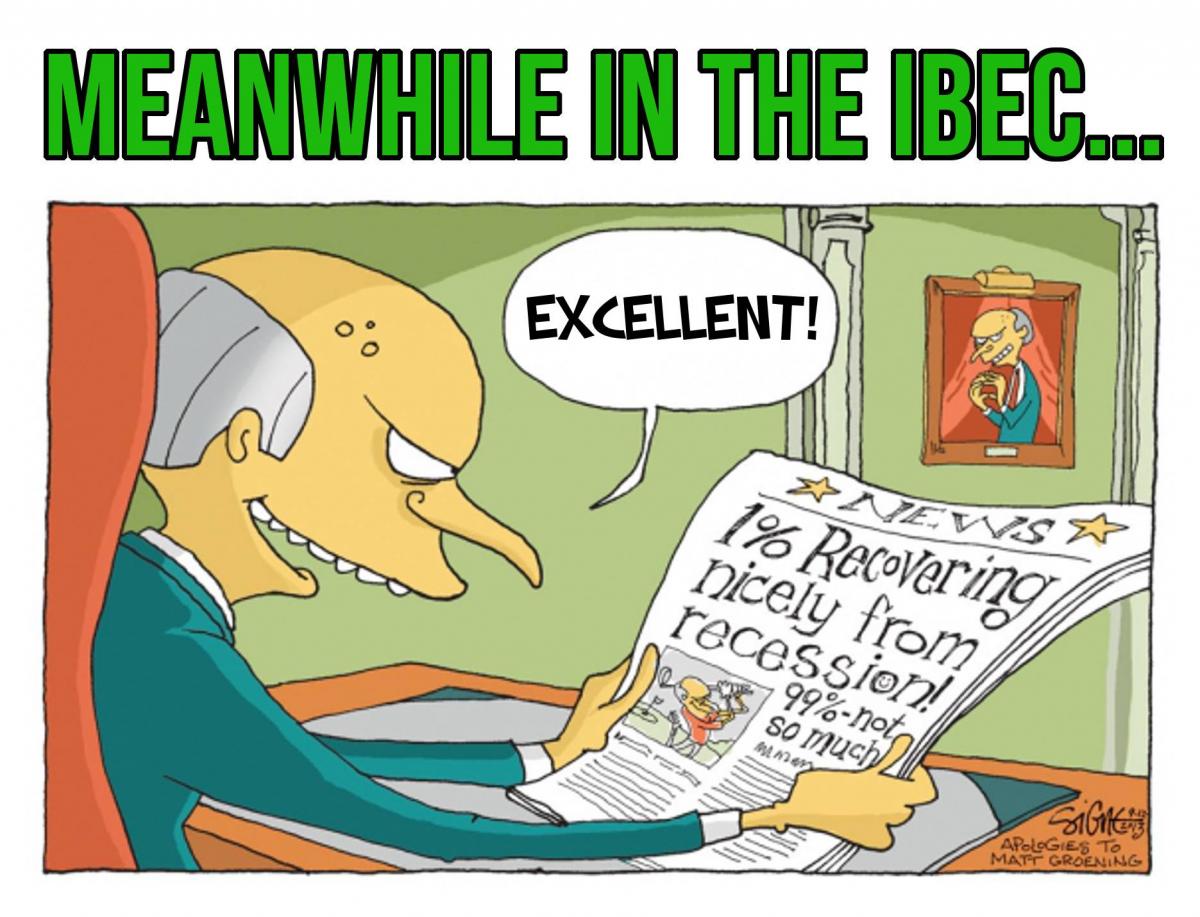Over 30 years of anarchist writing from Ireland listed under hundreds of topics
IBEC lobbies to keep the universal social charge and cut taxes for the rich
 As the 2016 General election got underway lobby groups had already set out their stall in terms of what they do and don't want to see in government policy. IBEC (the Irish Business and Employers Confederation) have launched their manifesto and have begun hosting political debates in plush surroundings. One of their most prominent calls to politicians is to leave the universal social charge untouched, not abolished, not reduced, and not modified to relieve lower earners from paying it.
As the 2016 General election got underway lobby groups had already set out their stall in terms of what they do and don't want to see in government policy. IBEC (the Irish Business and Employers Confederation) have launched their manifesto and have begun hosting political debates in plush surroundings. One of their most prominent calls to politicians is to leave the universal social charge untouched, not abolished, not reduced, and not modified to relieve lower earners from paying it.
The USC is often described in the media as Ireland's most hated tax, and it's easy to see why this might be so, it's applied to even those who are not earning enough to pay tax, or support themselves and their families.
The politicians' promises to reduce or remove the burden of the USC are dismissed as 'populist', which is used almost as a dirty word, as if the government doing what its people want is somehow a terrible thing. The underlying implication (or course rarely expressed overtly) is that 'populist' necessarily means policies that are not in the country's best interest, i.e. the people of Ireland are incapable of making choices in their best interest, or even of knowing what their best interests are!
Most people want to live in a fair world (although thanks to years of corporate/government propaganda a lot of people probably think this is true of them but not of others). IBEC would prefer 'balance'. They attack the higher tax rates on higher earners, claiming high earners are vilified, and that such a tax system penalises rather than rewards success. As if high wages were not reward enough, the government should reward high earners by making their earnings higher.
Of course if you cut taxes on high earners the only other place they can come from is low earners. And slashing USC would apparently also make the system more unbalanced, and would led to a narrower tax base - which is also supposed to be bad. Terms like this that are thrown around in the run up to elections, 'balance', 'broad tax base',are quite thinly veiled and they add up to the same thing: more wealth for the already wealthy.
IBEC reckons narrowing the tax base (i.e. relieving the burden on the low paid) would be to repeat past mistakes, and show that we have not learned the lessons of the economic crash. This is from a group that is also calling for economic growth. Unprecedented economic growth is what lead to the disaster, it certainly wasn't rich people not being rich enough.
Corporate lobby groups these days call for 'sustainable growth' (a delightful oxymoron) but they didn't raise a whisper of warning during the housing boom. 3 to 4% is touted as a sustainable level, but the doubling time for something growing at 3.5% is just 20 years, anyone who's played around with doubling figures knows how quickly they grow to huge numbers.
This belies the notion of 'sustainable growth', long-term there is of course no such thing. But it makes perfect sense that groups of 1 percenters would lobby for what can only be short-term growth - this is how you make profits and improve your quarterly financial reports. These are chairpersons, CEOs, managers in a capitalist system that rewards profits (short-term earnings) and punishes actual long-term sustainable thinking and policies.
IBEC is a powerful political lobby group that represents, largely, the interests of Ireland's 1 percent. While it's unlikely they'll get everything they want - politicians need votes as well as corporate backing - they are an influential voice. Do we want to live in their 'balanced' world or in a fair world? If greater fairness is what we strive for then we can't leave it to rich people to decide how it should be run.
There are two main factors that influence government policy: money and mass action. If we are to press for a fairer world we must organise and agitate.
WORDS: Fionnghuala Nic Roibeaird

